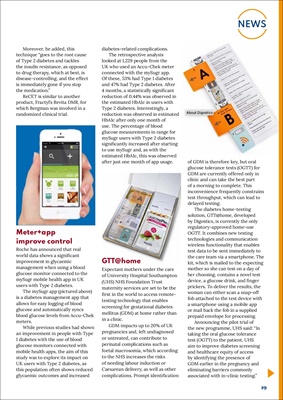
19
NEWS
Moreover, he added, this
technique "goes to the root cause
of Type 2 diabetes and tackles
the insulin resistance, as opposed
to drug therapy, which at best, is
disease-controlling, and the effect
is immediately gone if you stop
the medication."
ReCET is similar to another
product, Fractyl's Revita DMR, for
which Bergman was involved in a
randomized clinical trial.
diabetes-related complications.
The retrospective analysis
looked at 1,229 people from the
UK who used an Accu-Chek meter
connected with the mySugr app.
Of these, 53% had Type 1 diabetes
and 47% had Type 2 diabetes. After
4 months, a statistically significant
reduction of 0.44% was observed in
the estimated HbA1c in users with
Type 2 diabetes. Interestingly, a
reduction was observed in estimated
HbA1c after only one month of
use. The percentage of blood
glucose measurements in range for
mySugr users with Type 2 diabetes
significantly increased after starting
to use mySugr and, as with the
estimated HbA1c, this was observed
after just one month of app usage. of GDM is therefore key, but oral
glucose tolerance tests (OGTT) for
GDM are currently offered only in
clinic and can take the best part
of a morning to complete. This
inconvenience frequently constrains
test throughput, which can lead to
delayed testing.
The diabetes home-testing
solution, GTT@home, developed
by Digostics, is currently the only
regulatory-approved home-use
OGTT. It combines new testing
technologies and communication
wireless functionality that enables
test data to be sent immediately to
the care team via a smartphone. The
kit, which is mailed to the expecting
mother so she can test on a day of
her choosing, contains a novel test
device, a glucose drink, and finger
prickers. To deliver the results, the
woman can either scan a snap-off
fob attached to the test device with
a smartphone using a mobile app
or mail back the fob in a supplied
prepaid envelope for processing.
Announcing the pilot trial of
the new programme, UHS said: "In
taking the oral glucose tolerance
test (OGTT) to the patient, UHS
aim to improve diabetes screening
and healthcare equity of access
by identifying the presence of
GDM earlier in the pregnancy and
eliminating barriers commonly
associated with in-clinic testing."
Meter+app
improve control
Roche has announced that real
world data shows a significant
improvement in glycaemic
management when using a blood
glucose monitor connected to the
mySugr mobile health app in UK
users with Type 2 diabetes.
The mySugr app (pictured above)
is a diabetes management app that
allows for easy logging of blood
glucose and automatically syncs
blood glucose levels from Accu-Chek
meters.
While previous studies had shown
an improvement in people with Type
1 diabetes with the use of blood
glucose monitors connected with
mobile health apps, the aim of this
study was to explore its impact on
UK users with Type 2 diabetes, as
this population often shows reduced
glycaemic outcomes and increased
GTT@home
Expectant mothers under the care
of University Hospital Southampton
(UHS) NHS Foundation Trust
maternity services are set to be the
first in the world to access remotetesting technology
that enables
screening for gestational diabetes
mellitus (GDM) at home rather than
in a clinic.
GDM impacts up to 20% of UK
pregnancies and, left undiagnosed
or untreated, can contribute to
perinatal complications such as
foetal macrosomia, which according
to the NHS increases the risks
of needing labour induction or
Caesarean delivery, as well as other
complications. Prompt identification